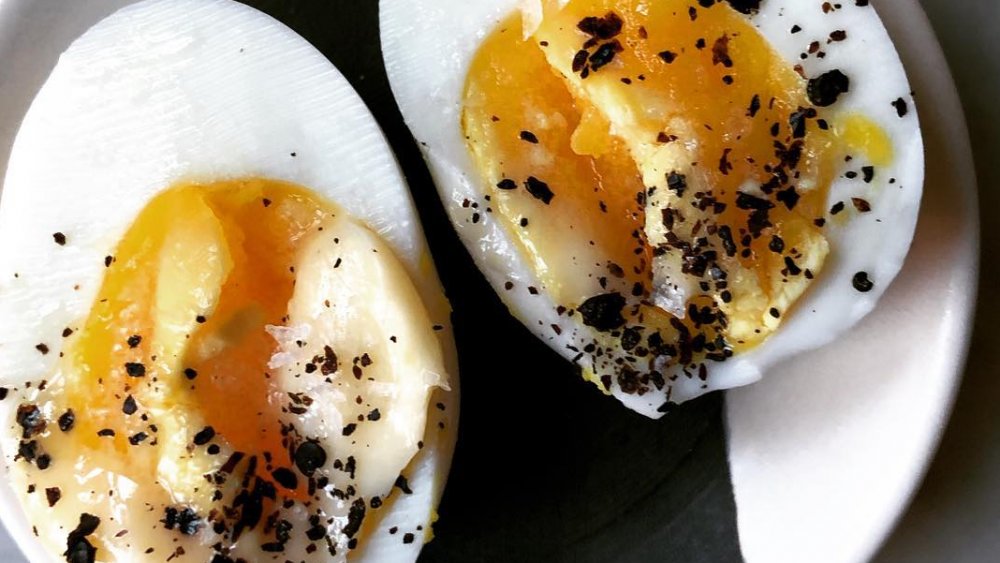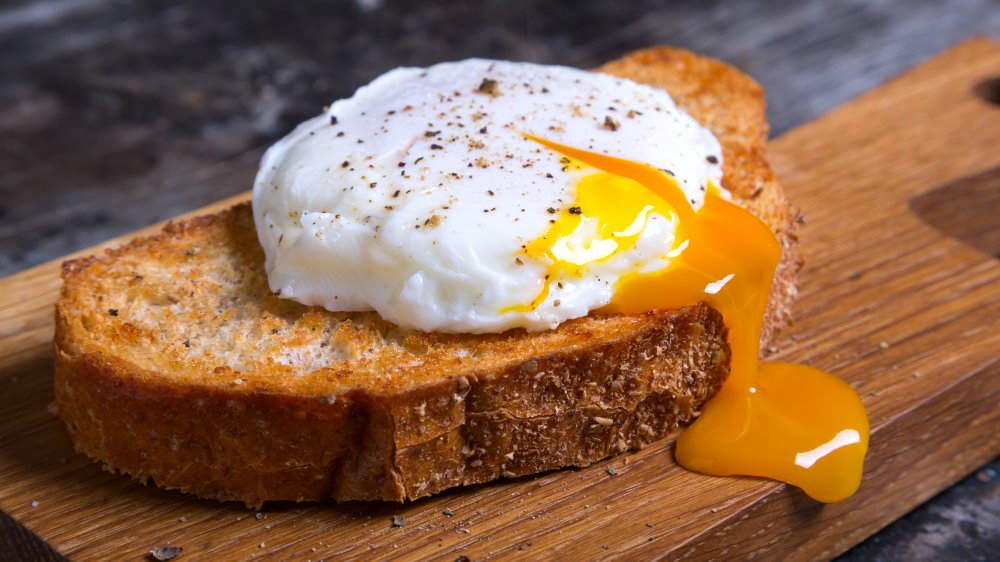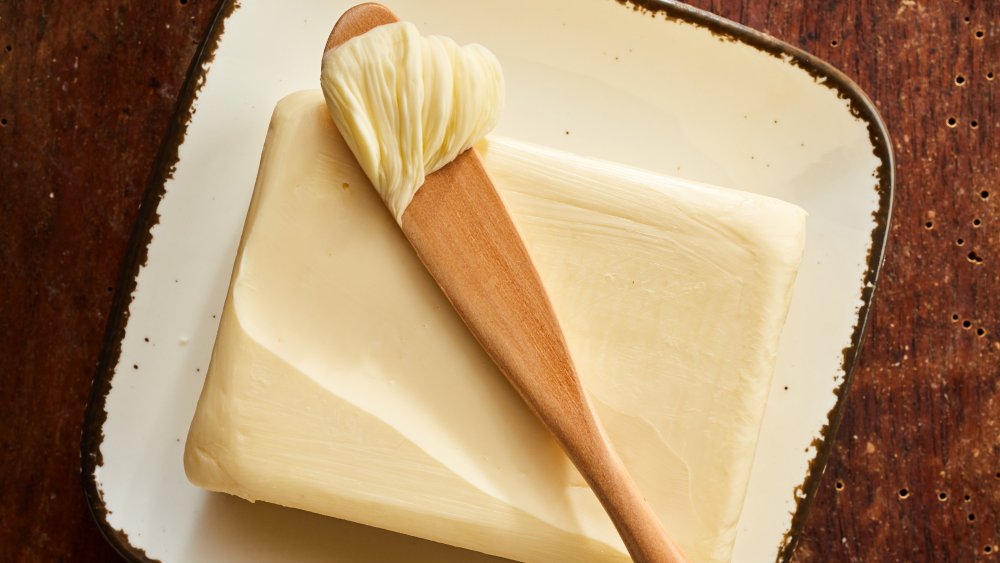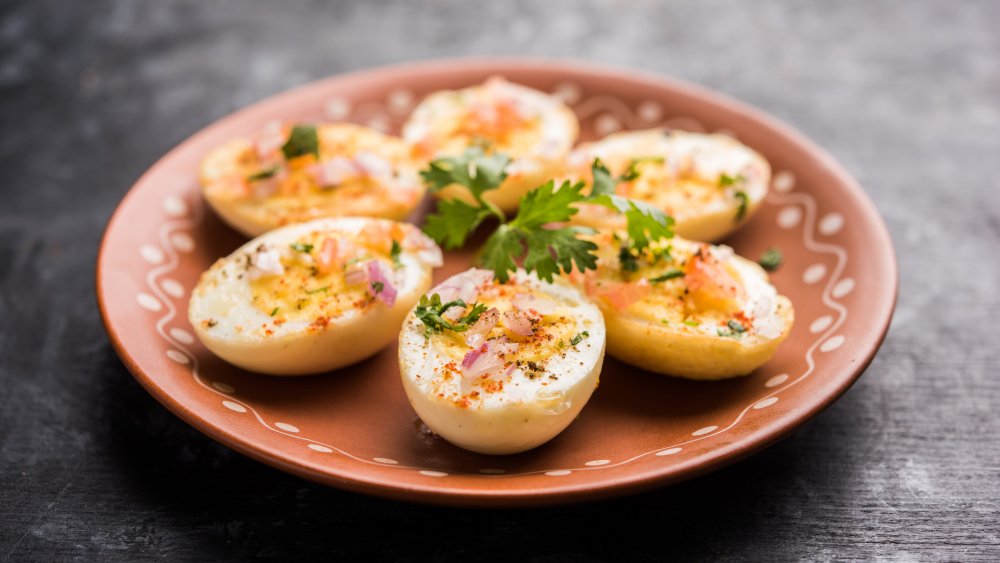Why You Should Be Adding Butter To Your Hard-Boiled Eggs
Eggs may be the most versatile food in the kitchen. How do I prepare thee? Let me count the ways. All kinds of ingredients, when added to scrambled eggs, can boost their flavor profile — everything from orange juice to peanut butter. As for hard-boiled eggs, you can gut the yolk, mix in some mayonnaise, mustard, and other stuff, et voilà! Deviled eggs. But there's another, super-easy way to liven up your hard-boiled egg that can be explained using only one word: butter.
Melissa Clark, award-winning food writer for The New York Times, didn't feel a need to devote an entire column to the topic — merely an Instagram post — but she created a buzz in food circles with her shout-out to buttered eggs. "Why are buttered eggs not a THING?? They should be!" Clark effused in her caption. She recommended boiling the eggs for five minutes, which leaves the yolk a gooey, medium-soft. A little salt and pepper, perhaps? For Clark, that wouldn't be your Morton iodized and McCormick ground black pepper. She ate her buttered egg with Maldon sea salt flakes and stone-ground Urfa chili peppers from Turkey, thank you very much. But you too can get a similar result.
Why do buttered eggs taste so good?
If buttered eggs are becoming a thing, then they are also getting a little backlash. When the folks at The Kitchn tried buttered eggs, they worried it might be overkill. Egg yolks are rich, and butter is even richer. So how are these two things supposed to complement each other? Well, we already know the two flavors go together. Who hasn't wiped up the dregs of their over-easy egg with some buttery toast? What about eggs Benedict? That beloved brunch staple features a poached egg covered in a sauce that is little more than egg yolk and butter mixed together. And cake is just eggs and butter baked in flour, with added sugar.
A scientific explanation of why buttered eggs taste so good isn't as easy as it might sound. This is because the science of taste is less advanced than the science of black holes. At least NASA knows what a black hole is, and where to find them. Taste, it turns out, is a little more elusive. "There is no accepted definition of a basic taste," behavioral geneticist Michael Tordoff told Live Science. "The rules are changing as we speak." Recent research suggests that fat — a big part of the butter and egg experience — might be a sixth flavor. Remember that not too long ago, we added umami as a fifth flavor, alongside sweet, bitter, sour, and salty.
Butter makes eggs, and everything else, better
While it's difficult to understand scientifically how taste works, it's just as tricky trying to describe what butter or eggs taste like. Users on Reddit were asked to describe the taste of an egg, and a lot of them couldn't come up with anything other than "eggy." As for butter, Vice profiled a chef who made it his mission to create the most flavorful butter on earth. Vice declared it "the butteriest butter" they'd ever eaten.
The American Egg Board, which came up with the famous "incredible, edible egg" slogan, couldn't say anything better than "mild or bland" to describe egg flavor. The Egg Board did have nicer things to say about the egg's ability to "enhance" and "carry" flavors, particularly through the fat in the yolk. Butter, meanwhile, is so good at boosting flavor and texture that restaurants lay it on thick in just about everything. You might leave a French restaurant having eaten an entire stick of butter in your meal, as Anthony Bourdain once told Oprah Winfrey. Regarding butter, Bourdain said there's "nothing like it."
A Food Network viewer asked chef Steven Wilson why butter makes everything better. He answered it can help raise a good dish to a great one, and credited butter's mouth feel. Wilson also explained that butter coats your mouth and tongue, creating a richness people love.
The goodness of buttered eggs is magic, not science
Scientists someday may explain why two great tastes taste great together. For now, let's just appreciate the magic that is fat. Samin Nosrat, the author of Salt, Fat, Acid, Heat, sings its praises in the Netflix series based on her book. "Fat: It's nothing short of a miracle," she says (via The Atlantic). "Fat adds its own unique flavor to a dish, and it can amplify the other flavors in a recipe. Simply put, fat makes food delicious — and one of the most important things any cook can learn is how to harness its magic."
Melissa Clark of The New York Times has certainly found a way to make some magic out of the simple combination of butter and hard-boiled eggs. Her recipe for a hard-cooked egg and basil-butter sandwich calls for basil and garlic to be stirred into the butter, which should then be spread all the way to the edges of the bread before adding the slices of hard-boiled egg. The eggs are cooked for nine minutes in this case so they hold up better during the slicing. Consider it an especially-tasty variation on the buttered-egg theme, proving once again how creative the simple egg allows us to be.



